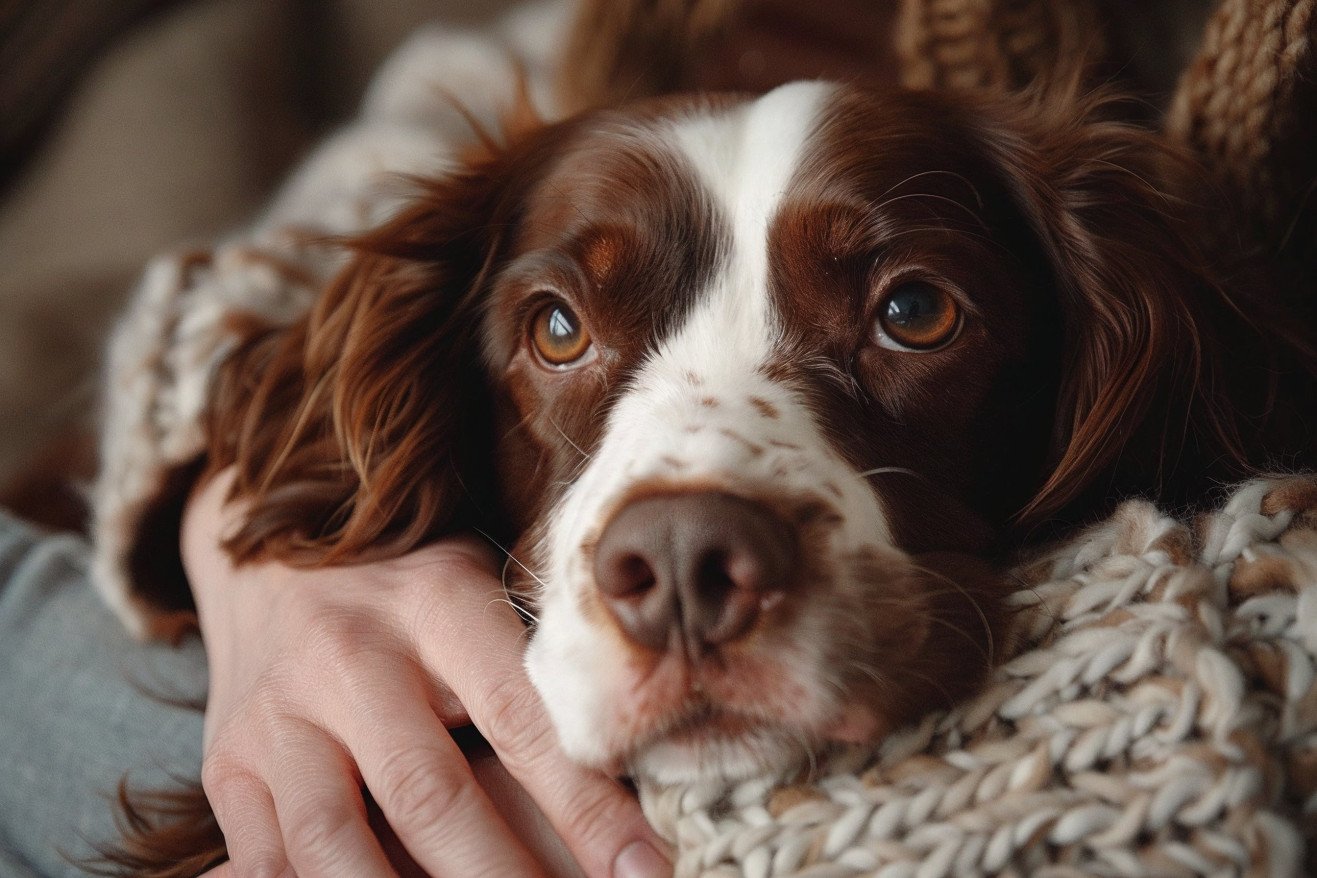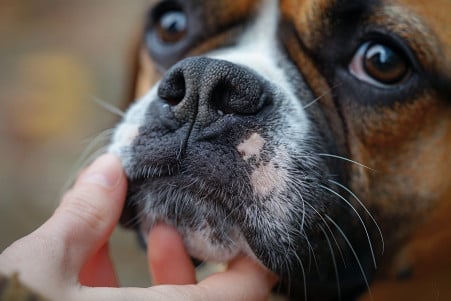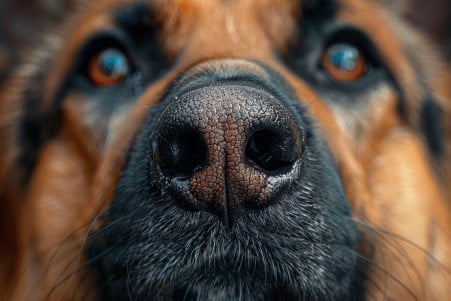My Dog Has a Runny Nose: What It Could Be, When to Worry, and When to Go to the Vet
17 March 2024 • Updated 17 March 2024

If your dog has a runny nose, it may be more than just an inconvenience. There are many potential causes of a runny nose in dogs, including allergies, infections, dental problems, and foreign objects in the nasal passages.
If your dog’s nasal discharge is clear, it’s less likely to be a cause for concern. However, if the problem doesn’t go away, gets worse, or if the discharge is any color other than clear, you should see a vet to get your dog a proper diagnosis and treatment.
In this article, we’ll take a deep dive into a wide range of scientific veterinary studies, peer-reviewed articles, and expert opinions to help us understand the many potential causes of a runny nose in dogs.
Throughout our research, we’ll look at physiological, pathological, and environmental causes to help you better understand this symptom. Our goal is to help you better understand when you should take your dog to the vet and to give you a better understanding of the potential treatments that may be recommended so that you can ensure your dog is as healthy as possible.
What could be the reasons for my dog having a runny nose?
What Your Dog’s Nasal Discharge Means
Nasal discharge is an important part of a dog’s health, and it can be a good indicator of how your dog is feeling. The Whole Dog Journal explains that nasal discharge can range from clear and watery to thick and colored, and each type of discharge can mean something different.
For example, clear and watery discharge is often nothing to worry about and can be a sign of mild nasal irritation, which may be caused by allergies. However, if the discharge becomes mucous-like, bloody, or purulent (containing pus), it’s time to pay closer attention.
Flat-faced dogs like pugs and bulldogs are especially prone to nasal discharge due to their breed’s anatomy. According to the Merck Veterinary Manual, these dogs are more likely to have nasal problems because of their narrow nasal passages.
Meanwhile, GoodRx explains that if the color of your dog’s nasal discharge changes to yellowish-green or there’s blood in the discharge, it could be a sign of a more serious issue like an infection or periodontal disease.
Dog owners should keep a close eye on their dog’s nasal discharge. Studies cited by BetterPet explain that if the consistency of the discharge changes suddenly, if the color changes suddenly, or if there are other symptoms present, these could be early signs of an issue. By keeping an eye on this, dog owners can make sure their dogs get the medical attention they need to manage any underlying health conditions.
Understanding the Underlying Causes of Your Dog’s Runny Nose
There are many reasons why your furry friend may have a runny nose. Allergies are common and can cause dogs to have an allergic reaction to a variety of different allergens, from pollen to perfume. WebMD notes that these allergies can also lead to sneezing, coughing, and even nosebleeds. On the other hand, infections, including bacterial, viral, and fungal infections, can lead to a runny nose with mucus or pus, as noted by PetMD.
If your dog has a foreign object in their nose, they may exhibit other symptoms, including sneezing or pawing at their nose. PetMD recommends watching for these symptoms.
Nasal discharge can also be caused by dental problems, especially if your dog has an infected tooth root or an oronasal fistula. According to Pets Best, environmental factors and your dog’s breed, especially if they have a brachycephalic skull, can also impact the likelihood and severity of nasal discharge.
Each of these causes can also present in different ways. For example, while clear nasal discharge is often not a cause for concern, it can be a concern if it’s accompanied by other symptoms, such as a change in your dog’s behavior or appetite.
These other symptoms can also help you determine the cause of your dog’s runny nose, so it’s important to pay close attention to your dog if you’re concerned about their health.
The Diagnostic Process: Identifying the Cause of a Dog’s Runny Nose
When your dog’s nose starts running and won’t stop, the vet will start their investigation with a detailed history and physical exam.
The Merck Veterinary Manual explains that the vet will look at the character of the discharge, its duration, and any other clinical signs like sneezing or coughing.
To further investigate, the vet will use diagnostic procedures. Imaging, like a CT scan, can provide a detailed look at the inside of the nose and show any structural issues or foreign bodies.
Ethos Vet notes that rhinoscopy, which uses a fiberoptic scope, can provide a real-time look at the nasal passages and is necessary to collect tissue samples for biopsies.
Visual exams are supported by lab work, including blood tests and nasal swabs, to help identify infections or inflammation.
Age and breed are taken into consideration when diagnosing a dog; what may be a minor issue in a young terrier may be a major red flag in an older bulldog.
According to Vetster, brachycephalic breeds are more prone to issues due to their unique anatomy. The end goal is to reach a diagnosis that can be treated specifically. After all, the only way to make sure your dog’s runny nose is treated and they can get back to their normal, sniff-happy selves is to figure out the underlying cause.
Treatments Based on the Cause of Your Dog’s Runny Nose
Once your vet has determined the cause of your dog’s runny nose, they will offer a variety of treatments that are specific to the underlying cause.
PetMD explains that if the cause is allergies, your dog may be given medication or supportive care to help with their symptoms.
Bacterial infections are typically treated with antibiotics, while fungal and parasitic infections are treated with antifungals and antiparasitics, respectively. If the cause is dental issues, your vet may prescribe antibiotics and painkillers, extract teeth, or recommend a special diet. Surgery is typically only used to treat more severe issues, such as nasal tumors or structural abnormalities.
Home care is also important in the recovery process. Pets Best suggests making changes to your dog’s environment, such as using a humidifier to help with congestion and ensuring that your dog has a calm, stress-free place to rest. Preventative care is also important: keeping up with vaccinations, maintaining dental health, and regular vet visits can help you manage and prevent runny noses.
Most importantly, it’s important to follow your vet’s recommendations to ensure that your dog is treated and recovers properly. Treatments are based on the individual needs of your dog, so what works for one dog may not work for another. By following your vet’s recommendations, you can help ensure that your dog has the best chance of recovering quickly and comfortably.
When to See a Vet
If your dog’s runny nose is accompanied by any of the following symptoms, it’s time to see a vet:
- Blood in the discharge
- Difficulty breathing
These symptoms can be indicative of more serious issues, such as nasal tumors or severe infections, that need to be addressed immediately. Waiting to seek treatment can lead to complications that make the issue even more serious.
You should also seek emergency care if you suspect that your dog has something lodged in their nose, which is a common cause of nasal issues in dogs, according to GoodRx. In addition, The Whole Dog Journal notes that severe infections need to be treated immediately to prevent them from turning into a more serious health issue.
If you need to take your dog to the vet, make sure to bring their medical history, including any incidents that may have led to their symptoms, and a list of any medications they’re currently taking. This information will help the vet and may speed up the process of diagnosing and treating your dog. Speed is often of the essence when it comes to ensuring your dog’s recovery and well-being.
Conclusion: How to Manage Your Dog’s Nasal Health
We’ve covered a lot of ground in this article, from the many causes of nasal discharge to the various ways it can be treated. We’ve learned that nasal discharge can be a sign of a number of things, from the mundane to the life-threatening, with allergies, infections, dental diseases, and foreign bodies being the most common causes, according to PetMD and Bond Vet.
Diagnosing the cause can involve a physical exam, rhinoscopy, and imaging, according to WebMD.
Treatments are tailored to the many causes of nasal discharge and can involve everything from medication to dental work to surgery, depending on the cause. It’s important to keep an eye on your dog’s nasal discharge and make note of any changes, as it can be an important early warning sign of your dog’s overall health.
It’s also important to remember that as a pet owner, you play a key role in your dog’s health, and that includes taking steps to prevent health issues before they start. This includes staying up to date on your dog’s vaccinations and managing their environment to reduce their risk of developing certain health issues.
Finally, recognizing and understanding your dog’s health symptoms is an important part of taking care of them and ensuring their health and happiness in the long run.


